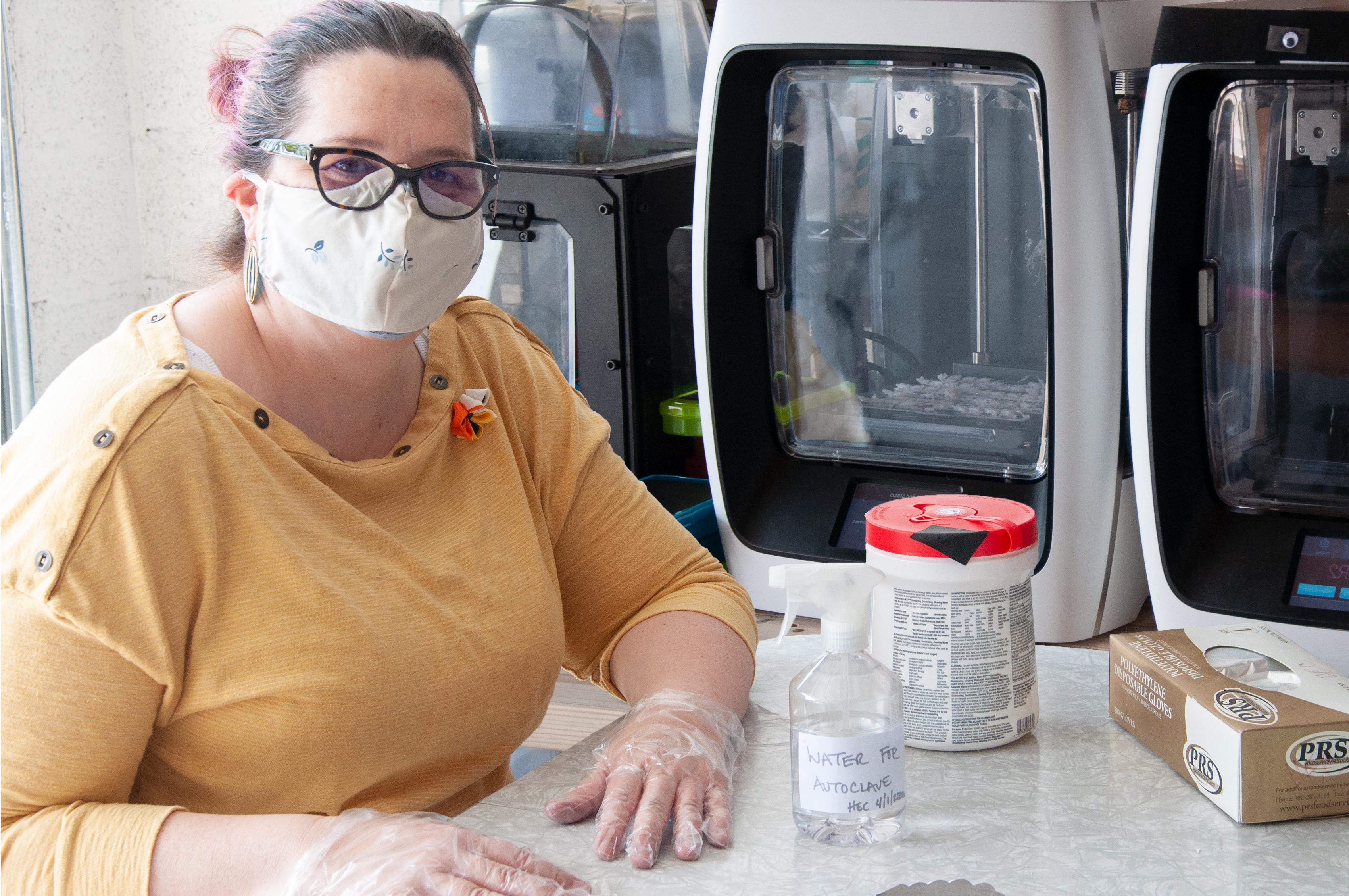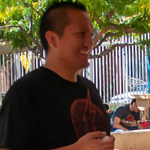NEWS
NM EPSCoR Impacts: The COVID-19 Response Efforts of RII2 NM EPSCoR Faculty Hire Heather Canavan

Professor Heather Canavan in her garage lab with 3D printers making protective face masks.
NM EPSCoR
In 2005, Heather Canavan was hired as an Assistant Professor by the University of New Mexico’s (UNM) Department of Chemical and Nuclear Engineering with support from NM EPSCoR through RII2 NM NEW – an award focused on developing nanoscience and hydrology capacity within the state. For Heather, EPSCoR functioned much like a wood brace does for a newly planted tree sapling.
“It provided not just the funding I needed to launch my career, but the support I needed when I came to New Mexico - and I’ve never forgotten it. It’s the kind of foundation I want to provide for the next generation of women and minorities in STEM.”
In the short-term Heather concentrated on setting up biomedically relevant courses and assisting with the creation of a new graduate program in Biomedical Engineering at UNM as part of the NM EPSCoR RII2 NM NEW award. Her hire (along with the hire of Dr. Elizabeth Dirk and Dr. Dimiter “Mitko” Petsev) increased faculty diversity in the School of Engineering, exemplifying the larger institutional transformation towards inclusion underway at UNM.
In 2009 she received the UNM School of Engineering Harrison Faculty Excellence Award and from 2010 – 2015 she was co-PI on two NSF grants aimed at improving engineering education (Award #0966153, Award #1068182, Award #0611616). Her upward trajectory would certainly have continued had she not been diagnosed with breast cancer in 2015.
“When I was diagnosed, I kept hearing, ‘you're never going to go back to normal’ or ‘your normal is over, it's gone’ and I'm hearing that same rhetoric now with the pandemic…and it's true, but it sounds so negative. It sounds so disheartening. Cancer, like this pandemic, is horrible. But surviving cancer also gave me a new perspective on my career and how I contribute to the world – and I can only hope that we emerge from this pandemic with some positives that make the world better for everyone.”
After undergoing treatment and recovery, Heather returned to work in 2017 and began her mission to “improve the world for herself and others” in earnest. She immediately co-founded Adaptive Biomedical Design, LLC a company devoted to “connecting idea generators with students, teachers, engineers, marketing and patent experts.” The following year she was named 2018 UNM Outstanding Teacher of the Year, became an AVS Fellow, received a Women in STEM award from UNM ADVANCE, and led the winning team to victory in UNM’s first-ever Health Hackathon.
Now known as Professor Canavan, Heather is a tenured faculty in the UNM Department of Chemical and Biological Engineering, and she’s been making headlines for her unique response to the COVID-19 pandemic.
“As soon as they started shutting stuff down on main campus, I thought, ‘this is serious’ and told my students to stay home and stay safe. After that, the conversation changed to, ‘ok – how can we help.”
Within days Professor Canavan had moved critical lab equipment like high-end 3D printers from her on-campus lab to her home garage.
“Once we got everything out, I started brainstorming with my group on ways we could assist with the COVID-19 crisis – and it just grew from there.”
While other UNM faculty like Christina Salas are coordinating large-scale efforts between the UNM Health and Sciences Center and School of Engineering to create a high-tech facility to fabricate protective equipment for healthcare workers that meet rigorous FDA requirements, Professor Canavan’s team has taken the low-tech approach: printing protective face shields in her garage and joining forces with a local brewery to manufacture and distribute hand sanitizer.
Professor Canavan has ingeniously coined the group’s pandemic response operations “Scrub Hub” – a plucky COVID-19 take on Grub Hub devoted to the delivery and distribution of PPE to those in need.
“I have great respect for our Governor’s Stay at Home order, and UNM President’s decision to limit the presence of students on campus. It is vital that we take care of our students. But so many people have lost their jobs because of this pandemic, and that’s risky too. By scaling up ScrubHub through Adaptive Biomedical Design, there is an opportunity here for us to help those people out by creating jobs. This also follows the recommendations of social distancing—although we all want to help out, and we all want to contribute, if all of us are going to buy fabric, then sewing, then delivering masks to hospitals, then everyone raises their risk of exposure to COVID. But if they are part of ScrubHub, we can deliver kits to their front porch with materials that are getting harder to come by. And when they’re finished, they can put their home-made PPE back on the porch, and a Scrubaroo will come and pick it up. We’ll sterilize it, and get it to the vulnerable people in our state that need it.”
To date, her lab has raised almost $1,300 through their GoFundMe campaign, and distribution has already begun. For more information, they’ve created a website for their volunteer Scrubaroos: https://adaptivebiomedicaldesign.com/scrubhubabq.
Professor Canavan exemplifies the positive and yet unreported long-term repercussions of New Mexico’s participation in EPSCoR. She is here partly because of EPSCoR, her first lab was paid for by EPSCoR, and her contributions to the New Mexico STEM community have been more fruitful than anyone could have imagined back in 2005 when EPSCoR gave support to a promising sapling professor.


